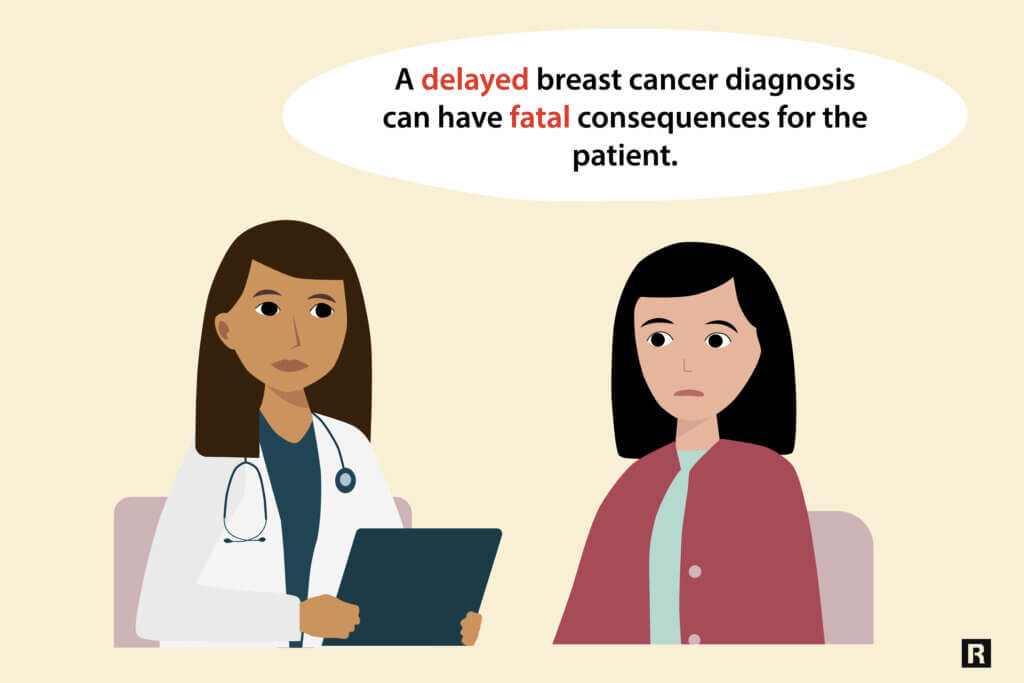
Breast cancer is the most common cancer diagnosed in women. It is estimated that as many as 1 out of every 2 women in the United States will develop this form of cancer at some point. Unfortunately, many women with breast cancer don’t get diagnosed until their disease has spread to other parts of the body (metastasized). Initially, malignant cancer cells form in the tissues of the breast, and these cells typically expand and proliferate slowly. They can spread to other parts of the body, however, creating a potentially life-threatening problem.
Breast cancer prevention measures are widely publicized and women are generally well-aware of the need for annual mammograms. What is less well-known or understood is that avoidable delays in diagnosis sometimes lead to detrimental outcomes. This article aims to inform readers about medical malpractice as it relates to a delayed breast cancer diagnosis, what might lead to failure to diagnose breast cancer, and how patients may have the right to take legal action if they’ve been harmed due to negligence by those responsible for it.

What Is a Delayed Diagnosis?
Generally speaking, delayed diagnosis is a type of malpractice used to describe the failure to promptly diagnose or detect an injury or illness. Delayed diagnosis occurs when a patient’s symptoms are dismissed as less severe than they are and, consequently, aren’t addressed until it’s too late to avoid permanent damage. Unfortunately, this can have fatal consequences for the patient.
It’s important to note that delayed diagnosis of breast cancer is not the same as breast cancer misdiagnosis, which occurs when a doctor incorrectly diagnoses a patient with breast cancer, but they actually have had a different condition. Delayed diagnosis refers to the situation when the correct diagnosis could have been made if the patient had been seen by another doctor or in another healthcare setting.
Causes of Delayed Diagnosis of Breast Cancer
The causes of breast cancer’s delayed diagnosis are complex and include both patient and healthcare system factors.
Patient factors might include:
- Lack of symptoms, especially in early-stage breast cancer
- Lack of information about the availability and effectiveness of screening tests
- Reluctance to undergo screening tests due to fear or anxiety
- Failure to recognize the importance of timely follow up after a positive screening test
Healthcare system factors might include:
- Failure to educate patients on things like self-exams and early screening especially when there is family history
- Failure to refer patients for appropriate diagnostic investigations, including mammograms, blood tests and biopsies
- Failure to detect abnormalities on mammography or ultrasound imaging
- Failure to perform diagnostic investigation when abnormalities are detected on mammography or ultrasound imaging
- Failure to perform an excisional biopsy or lumpectomy when the patient has suspicious findings on mammography, including microcalcifications, ductal carcinoma in situ (DCIS), and architectural distortion
What Is Medical Malpractice?
Medical malpractice is a legal term that describes when a physician, another healthcare professional, or a healthcare organization deviates from accepted standards of care in managing, diagnosing, or treating a patient. This deviation from the standard duty of care that is expected of all medical professionals is usually caused by negligence. Any one of the healthcare system factors mentioned earlier would constitute medical malpractice.
There are three common types of medical malpractice lawsuits. One is a failure to make a correct diagnosis. This occurs when a physician fails to perform all necessary steps to determine the nature of the patient’s medical problem. Failing to make a correct diagnosis of breast cancer, for example, can lead to delays in proper treatment. That, in turn, could increase a patient’s physical and emotional suffering, necessitate more aggressive treatments, and even lead to death.
Can You Sue a Physician for Delayed Diagnosis of Breast Cancer?
A delayed diagnosis of breast cancer can be grounds for a medical malpractice case. If a patient believes that a doctor or healthcare facility committed medical malpractice, they can file a lawsuit. Medical malpractice often involves complex medical and legal issues. These issues are usually vigorously defended by healthcare practitioners, their insurers, and legal teams. Investigating a possible case entails obtaining and reviewing relevant medical records, determining the potential problems, and consulting with medical and legal experts to evaluate whether there were any breaches of the standard of care that caused injury or harm. Certain criteria need to be met to file such a lawsuit.
These include the following:
- The patient must have been harmed as a result of the doctor’s negligence or misconduct.
- There should be evidence that this harm was caused due to negligence or misconduct on behalf of the doctor.
- It must be proven that this negligence or misconduct was responsible for causing damage to the patient.
How Long Should You Wait Before Suing?
Like all civil cases, medical malpractice suits must be filed within a set timeframe. That time frame is known as a “statute of limitations.” Every state has its own statute of limitations for medical malpractice lawsuits. This means that after discovering the doctor’s mistake, you have a certain amount of time, generally between one and three years, to pursue litigation against them. If you miss this deadline, your case will be thrown out without further consideration by the court or jury.
In some states, the statute of limitations for medical malpractice claims is one year (or less) from the date you knew or should have known that your injury was caused by medical negligence. However, there are some exceptions to this rule, and you ought to consult an attorney for more specific information about your case.
Possible Outcomes of a Medical Malpractice Case
There are a few possible outcomes of a medical malpractice lawsuit:
1. An out-of-court settlement: This is the most common outcome of any medical malpractice lawsuit. Even if a jury finds that the doctor was negligent, it does not mean the jury will award damages to the injured party. If the parties agree on an amount, then it is up to them to work out the details and reach a settlement agreement. These settlements usually involve payment from insurance companies rather than from doctors themselves, although some doctors carry their own insurance policies in case they are sued for medical malpractice.
2. A jury verdict in favor of the patient: This means that the jury has decided that the doctor’s negligence was responsible for causing the patient’s injury. Typically, the amount of damages will depend on the severity of harm caused to the patient, but it is usually hard to predict what a jury might award. Some states allow for punitive damages, which are awarded when a defendant has acted in an especially reckless or negligent manner. Punitive judgments can be significant, but they are rare.
3. A jury verdict in favor of the doctor: This means that the jury has determined that all of the patient’s claims have been proven invalid. This can happen when the patient is unable to prove that there was negligence by the doctor or hospital organization or if they are able to prove it, but not show that it caused them any injury.
4. A directed verdict (judge’s decision) in favor of either party: A directed verdict is issued when the judge feels that there is not enough evidence to support a patient’s claim or when there is no dispute as to whether or not the doctor or medical facility is liable for damages.
What Should You Do if You Suspect a Doctor Was Negligent?
If you suspect that your doctor missed a breast cancer diagnosis and are considering filing a medical malpractice suit, it’s important to seek legal assistance from a lawyer who specializes in this type of litigation. The sooner you do so, the more time they will have to assess your case to determine whether or not you may be entitled to compensation for medical bills, lost wages or other forms of suffering due to the delayed diagnosis of breast cancer.
At Rosenblum Law, we’ve been handling medical malpractice claims for decades. We work with medical experts to help support our clients’ claims, and are experienced negotiators when it comes to working with insurance companies. Our firm is here to help you make sense of your options and protect your rights as a patient. Contact us today for an initial consultation.
References:
Hyams AL, Shapiro DW, Brennan TA. Medical practice guidelines in malpractice litigation: an early retrospective. J Health Polit Policy Law. 1996;21(2):289-313.
Gutorova N, Zhytnyi O, Kahanovska T. Medical negligence subject to criminal law. Wiad Lek. 2019;72(11 cz 1):2161-2166.


